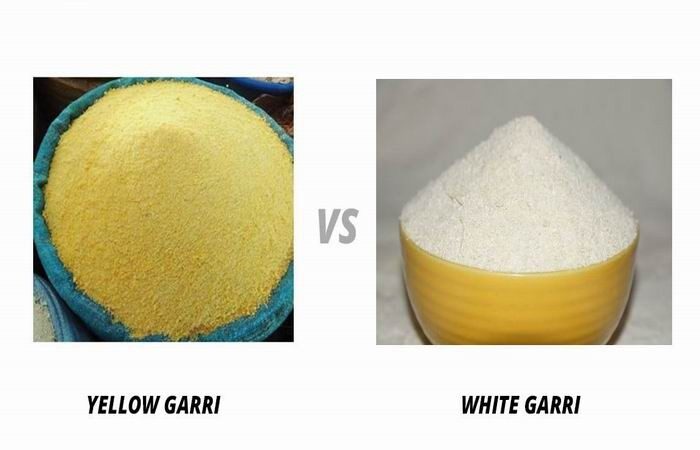
Garri, a popular West African staple, has won the hearts of many with its versatile uses and delightful taste. However, beneath its seemingly harmless exterior lies a few potential side effects that merit our attention. In this blog post, we delve into the lesser-known consequences of soaked garri consumption, shedding light on its impact on our health.
Understanding Garri

Before delving into the potential side effects, it’s essential to understand what garri is and how it’s consumed. Garri is a processed cassava product that is often fermented and roasted. It is typically consumed as a soaked drink made by adding water to garri and stirring until it forms a thick, starchy mixture.
Nigeria boasts a diverse culinary landscape, and garri, a staple food, can be turned into various forms that is edible, each with its unique texture and flavor. Here are some popular types:
Eba Garri

This is the most common type of fried garri, characterized by its coarse texture and slightly grainy feel. Eba garri is often used for making a thick, starchy dish called “eba”. This is then used to eat another type of dish soup.
Ijebu Garri

Hailing from Ijebu, a region in Ogun State, Ijebu garri is known for its fine texture and slightly sweet taste. It is often preferred for making a smooth, creamy soaked drink.
Akara Garri

This type of garri has a darker color and a slightly smoky flavor due to the roasting process. Akara garri is often used for making the popular Nigerian snack “akara,” but it can also be enjoyed as a soaked drink.
Yellow Garri

As the name suggests, yellow garri has a distinct yellow hue and a slightly sweet taste. It is often used for making a variety of dishes, like eba and also soaked garri.
White Garri

This type of garri has a pure white color and a neutral taste. It is commonly used for making soaked garri, especially in regions where the cassava roots used to make garri are naturally white.
Potential Side Effects of Soaked Garri
While garri is generally safe when consumed in moderation, excessive consumption or improper preparation can lead to several health issues. Here are some of the potential side effects:
Nutritional Value of Garri
Garri is a good source of carbohydrates, which provide energy. It also contains vitamins and minerals, including vitamin B, iron, and calcium. However, the nutritional value of garri can vary depending on the processing methods used and the quality of the cassava roots.
Cyanide Poisoning: A Looming Threat
One of the crucial factors to consider when indulging in garri is its cyanide content. Cassava, the primary ingredient in garri, contains cyanogenic glycosides, compounds that can release cyanide when broken down in the body. Unfortunately, some garri processing plants might fall short in maintaining proper sanitation practices, inadvertently leading to the introduction of high levels of cyanide into the final product.

Cyanide poisoning can have serious implications for our health, ranging from mild symptoms like headache and dizziness to more severe outcomes such as organ damage. Therefore, it is of paramount importance to ensure that the cassava used in garri is prepared diligently to minimize the risk of cyanide poisoning.
Consuming excessive amounts of soaked garri can increase the risk of cyanide poisoning. Symptoms of cyanide poisoning include dizziness, headache, nausea, vomiting, and difficulty breathing. In severe cases, it can be fatal. To reduce the risk of cyanide poisoning, it’s essential to ensure that garri is properly processed and consumed in moderation.
Weight Gain Woes: The High-Carb Conundrum

While garri might appear to be a modestly calorie-containing food, its high carbohydrate content can contribute to weight gain when consumed excessively. A staple in many households, garri is often used to make eba, a dish enjoyed in generous portions. The cumulative effect of consuming substantial amounts of high-carb of it can tip the balance of our caloric intake and expenditure, leading to unwanted weight gain over time.
Digestive Issues
- Excessive consumption of garri can lead to digestive problems, such as constipation, diarrhea, and bloating.
- The high fiber content of garri can be beneficial for digestion, but excessive intake can cause discomfort.
- It’s important to consume garri in moderation and stay hydrated to prevent digestive issues.
Nutrient Deficiency

- While garri provides some essential nutrients, relying solely on garri for nutrition can lead to nutrient deficiencies.
- It’s important to include a variety of other foods in your diet to ensure you get all the necessary nutrients.
Blood Sugar Spikes

- The high carbohydrate content of garri can cause blood sugar spikes, especially in people with diabetes.
- If you have diabetes, it’s important to monitor your blood sugar levels carefully and consume garri in moderation.
Read Other Posts Like…
- 10 TYPES OF HAIRSTYLES THAT BRINGS OUT THE BEAUTY IN YOU
- Reasons Nigeria Cannot Go to War With Niger Republic
- 5 Books to Aid Your Spiritual Growth: A Journey of Faith and Transformation
Tips for Consuming Garri Safely
- Choose high-quality garri. Look for garri that is made from properly processed cassava roots.
- Consume in moderation. Enjoy garri as part of a balanced diet and avoid excessive consumption.
- Prepare it properly. Follow the recommended preparation instructions to reduce the risk of cyanide poisoning.
- Combine with other foods. Pair garri with protein-rich foods and vegetables to create a balanced meal.
- Stay hydrated. Drink plenty of water to prevent dehydration and digestive issues.
In Conclusion
Garri, a beloved delicacy in West African cuisine, possesses certain side effects that should not be overlooked. From the potential risk of cyanide poisoning due to inadequate processing practices to the propensity for weight gain brought about by its high carbohydrate content, it’s crucial to approach garri consumption with awareness and moderation. By making informed choices and adopting a balanced diet, we can continue to relish this culinary delight while safeguarding our health and well-being.
Would this make you limit the consumption of soaked garri let us know in the comment section below.
Frequently Asked Questions (FAQs)
- Is garri safe to consume during pregnancy?
- While garri is generally safe during pregnancy, it’s essential to consume it in moderation and ensure proper preparation to reduce the risk of cyanide poisoning.
- Can I eat garri every day?
- It’s best to consume garri in moderation and include a variety of other foods in your diet.
- Is there a safe amount of garri to consume?
- The recommended daily intake of garri may vary depending on individual needs and health conditions. It’s best to consult with a healthcare professional for personalized advice.
- Can I make garri at home?
- Yes, you can make garri at home, but it requires proper processing techniques to reduce the risk of cyanide poisoning.
- Are there any alternatives to garri?
- There are other starchy foods that can be enjoyed as alternatives to garri, such as rice, beans, and plantains.
You May Also Like TO Read…
- Funny and Fascinating Love Facts You Need to Know
- Affiliate Marketing: What It Is and How to Get Started
- Weight Loss Nutrition-Focused Meal Plans
- The History of the Catholic Church


